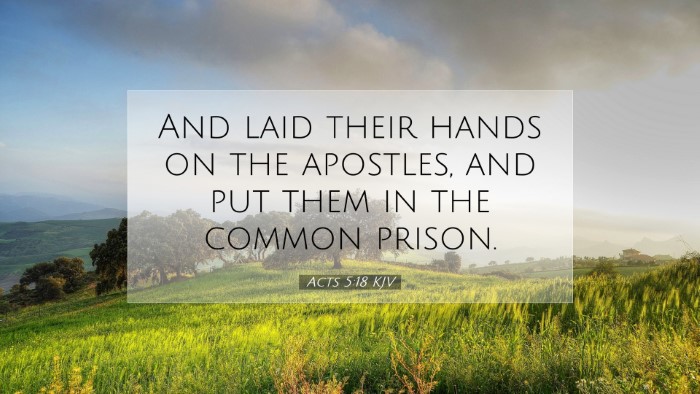Commentary on Acts 5:18
Verse Text: "And laid their hands on the apostles, and put them in the common prison."
Introduction
The fifth chapter of the Book of Acts details a critical juncture in the early Christian community, showcasing both the profound commitment of the apostles to their mission and the escalating hostility from the religious authorities. Acts 5:18 encapsulates the response of these authorities to the burgeoning influence of the apostles. This commentary draws from notable public domain sources, including Matthew Henry, Albert Barnes, and Adam Clarke, to provide a comprehensive understanding of this verse.
Contextual Analysis
To fully appreciate Acts 5:18, it is essential to consider the larger context of Acts 5. This chapter narrates the increasingly evident power of the early church, demonstrated through miraculous healings and bold preaching. However, it also highlights the opposition faced by the apostles, particularly from the Sadducees, who were intent on quelling the influence of this new sect.
Matthew Henry's Insights
According to Matthew Henry, the action of laying hands on the apostles signifies the aggressive measures taken by the authorities to suppress the spread of the Gospel. He reflects on the broader spiritual implications, arguing that such persecution often serves to strengthen the resolve of believers. Henry comments on the poor judgment of the authorities in attempting to curb what was manifestly a divine movement.
Albert Barnes' Commentary
Albert Barnes emphasizes the sheer audacity of the arrest, noting that it was not just the apostles who were targeted but the very message they preached. He argues that the apostles' imprisonment demonstrates the challenges of ministry amidst profound opposition. Barnes outlines that the prison symbolizes the oppressive bounds that religious authorities sought to impose on the burgeoning Christian faith, yet it is also a setting where faith can be tested and showcased.
Adam Clarke's Exposition
Adam Clarke provides a thorough analysis of the motivations behind the actions of the Sadducees. He notes their vested interest in maintaining the status quo, particularly their denial of the resurrection, which the apostles continuously proclaimed. Clarke points out that this confrontation is emblematic of the greater spiritual warfare between the forces of light and darkness, underscoring that such trials have historical precedence throughout scripture.
Theological Implications
The events leading up to and including Acts 5:18 raise significant theological discussions relevant to modern readers.
Persecution and Its Purpose
- Strengthening Faith: Commentators like Henry suggest that persecution often purifies and solidifies the faith of true believers. Just as gold is refined by fire, so too does opposition refine the Christian character.
- A Divine Mission: The apostles’ imprisonment can be viewed as part of God’s sovereign plan. As Barnes notes, even in confinement, the apostles' commitment to spreading the Gospel is not hindered, demonstrating the unstoppable nature of the Holy Spirit.
- A Call to Perseverance: Clarke encourages believers today to view such opposition as a call to greater perseverance, reinforcing the notion that suffering can lead to greater faithfulness in one’s witness.
Practical Applications
The implications of Acts 5:18 extend to ecclesiastical practice and individual believer’s lives. Several key applications emerge from this passage.
Understanding Authority
It is crucial for pastors and church leaders to understand the nature of spiritual authority and its limits. The actions of the Sadducees serve as a reminder that human authority is often challenged by God’s divine authority. The church must navigate these dynamics with wisdom and courage in a contemporary context.
Resilience in Ministry
Modern ministers can draw strength from the apostles’ example. Acknowledging that opposition and challenges are part of the Christian journey, leaders are called to foster resilience, maintain their witness, and empower their congregations to do the same.
The Power of Unity
The communal aspect of the early church is pivotal. Despite imprisonment, the apostles remained united in purpose. This challenges contemporary churches to cultivate unity, prayerfulness, and an unwavering commitment to mission even in the face of adversity.
Conclusion
Acts 5:18 is more than a mere historical account; it encapsulates enduring truths about the Christian journey amidst opposition. By synthesizing insights from Matthew Henry, Albert Barnes, and Adam Clarke, we discover a rich tapestry of meaning that speaks to the heart of faith amidst trials. Understanding the dynamics of persecution, authority, and the continued commitment to God's mission offers a resonant message for pastors, students, theologians, and all who seek to engage deeply with the scriptures.


